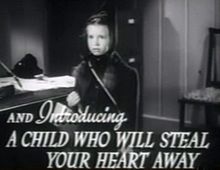Journey for Margaret
| Journey for Margaret | |
|---|---|
 Margaret O'Brien in the movie trailer | |
| Directed by | W. S. Van Dyke |
| Written by | William Lindsay White (novel) David Hertz William Ludwig |
| Produced by | B. P. Fineman Dore Schary |
| Starring | Robert Young Laraine Day |
| Cinematography | Ray June |
| Edited by | George White |
| Music by | Franz Waxman |
| Distributed by | Metro-Goldwyn-Mayer |
Running time | 81 minutes |
| Country | United States |
| Language | English |
| Budget | $484,000[1][2] |
| Box office | $1,534,000[2] |
Journey for Margaret is a 1942 drama film set in London in World War II.[3] It stars Robert Young and Laraine Day as a couple who have to deal with the loss of their unborn child due to a bombing raid. It is an adaptation of the novel of the same name by William Lindsay White.
Plot
War correspondent John Davis moves from France to safer London with his wife Nora during World War II. Nora is pregnant and John wants her to go back home to Connecticut, but she decides to stay on by his side. John is worn down by the war and Nora has her doubts about his conviction as a reporter.
During the London blitz, John is walking around in the rubble, moved when discovering a desperate young boy. As he returns home he learns that his wife has been hurt during the bombings and taken to hospital.
It turns out Nora has lost the baby and is permanently injured, meaning that she will never be able to bear another child. Nora is devastated when she hears the news about her condition.
It takes months for Nora to recover and when she does, John tries to put her on a flight home to the U.S. She agrees, but John's colleague, Herbert V. Allison, tries to convince her to stay on and fight to get over the ill fate that has been laid upon her. Despite this, she goes home.
John continues his work, writing about an orphanage for war children. He meets with the director, Trudy Strauss, and starts caring for the children. He also meets the boy he saw in the streets of London, Peter, who is mute since he arrived at the orphanage.
John returns a toy he found in street after the blitz to Peter and the boy sees him as a father. Another child, Margaret, comes to the orphanage after being at foster parents. She has a bomb casing in a chain around her neck. She has to learn to cry for her dead parents.
At tea time, Peter comes around and starts communicating with the other children. Both Peter and Margaret open up to John in the evening and want him to help them. Later, bombers fly over the orphanage and John helps calm the children.
London is bombed again during the night and John and Allison go around looking for storkes to write, when they en ounter a woman carrying a dead baby. John is more and more upset and is inspired to write stories. Back at the orphanage, Peter and Margaret are meeting their prospective foster parents. John agrees to accompany them but they start clinging to John and don't want to leave him to be with them, even though they are very nice.
Via cable John asks Nora to adopt the two children and bring them back with him to her in the U.S. Nora's mother answers that Nora is ill, but that she doesn't want the children. After a while though, Nora cables John and tells him she has changed her mind, and wants him to bring the children.
It turns out the plane between London and Portugal is full. John tries to negotiate with the passengers to not use their full baggage allowance, but it doesn't work. John is only allowed to bring one child, and is adviced to let the children perform an IQ test to determine which to bring with him. Margaret scores higher, but Peter cries out "daddy" after John when he is about to leave. Heartbroken, John still goes to the airport with Margaret, but when he is about to board the plane, one of the other passengers has given up her place on the plane to Peter.
Later, after a long trip, John and the children arrive by ship to the port in New York, watching the shimmering lights of the city in the distance. Nora comes to meet them on the ship. There is an air raid alarm, but Nora tells the children they will never have to worry that the lights in the city will be turned off once the war is over.
Cast
- Robert Young as John Davis
- Laraine Day as Nora Davis
- Fay Bainter as Trudy Strauss
- Nigel Bruce as Herbert V. Allison
- Margaret O'Brien as Margaret White
- William Severn as Peter Humphreys
- Leyland Hodgson as Censor
Reception
The film was a surprise hit - according to MGM records it made $779,000 in the US and Canada and $755,000 elsewhere, earning a profit of $561,000.[1][2]
